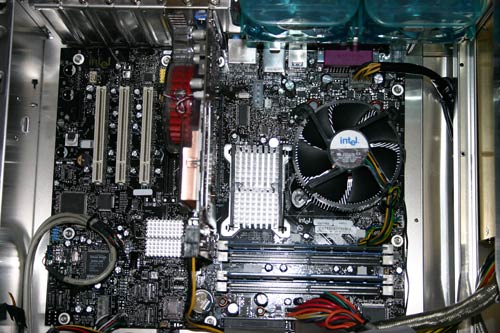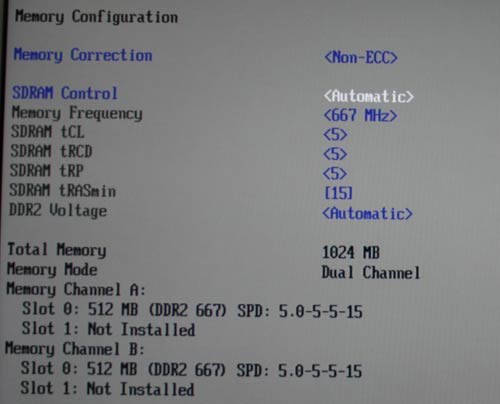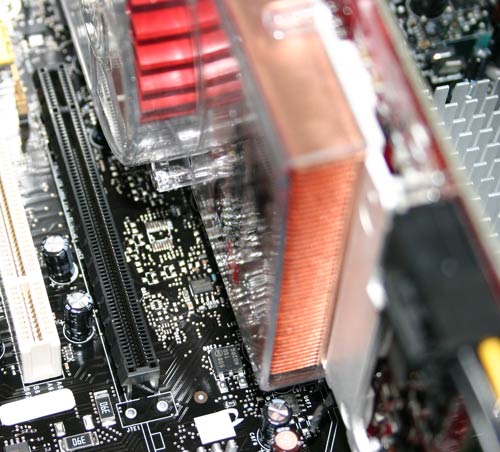Intel Dual Core Performance Preview Part I: First Encounter
by Anand Lal Shimpi on April 4, 2005 2:44 PM EST- Posted in
- CPUs
The Platform: Intel 955X
AMD's dual core Athlon 64 processors will work in all current Socket-939 motherboards with merely a BIOS update. The same level of compatibility obviously isn't true for Intel's dual core solutions. You'll need a new motherboard to support the Pentium D and Pentium Extreme Edition chips, and thus, Intel shipped us a board based on their soon-to-be released 955X platform.

The platform boasts a dual channel DDR2-667 memory controller, but given that the chips still only support an 800MHz FSB, the added bandwidth of DDR2-667 is useless. Even for bragging rights, running at DDR2-667 doesn't make sense, as the memory that Intel shipped with the system is rated at 5-5-5-15 timings at 667MHz. Wasted bandwidth and higher latency memory is nothing to get excited about in our book. We're not entirely sure what Intel is up to, but they had better plan on increasing the FSB of their chips really soon if they want DDR2-667 (or even 533) to gain any sort of acceptance.

Other than support for dual core, faster DDR2, RAID 5 and 8GB of ECC memory, the 955X doesn't have any features to boast over the current platforms. It does look like Intel may be planning SLI support for the 955X however:

The 955X board that we received had two physical x16 PCIe connectors, but only one of them was electrically a x16 slot.
Despite Intel's warnings not to make any judgments about final performance or stability, both the 955X and the Pentium Extreme Edition were as rock solid during our testing as any product that we've encountered. This was quite possibly the most stable encounter with a pre-release CPU, chipset and drivers that we've ever had. That being said, we really didn't expect Intel to break tradition with a platform of which they weren't 100% sure.










141 Comments
View All Comments
Hans Maulwurf - Monday, April 4, 2005 - link
#27 thats because these benches are opted for HT and dual core. Everybody should know they are not typical for usage of a desctop PC.Maybe dual core will be a good thing, but to value its implementation you have to compare it to, for example, a dual Xeon.
If I would take this review seriously we all should have buyed dual CPU systems some time ago. But some time ago nobody could show dual CPU desctop systems are useful.
Why did this change so radicially? Is it really the way we use our computers or is it just the way you benchmark when allowed to be one of only very few Intel-previewers?
Son of a N00b - Monday, April 4, 2005 - link
#11, next time label you post with *Caution Fanboy Post* so I do not waste my time reading your comments that are biased and misinformed...w0w! great preview, I cannot wait until six months from now you doing a head to head match up with SLI, dual core cpu rigs from both AMD and Intel....it should be very interesting indeed....Cannot wait to see what AMD's performancee is...it could go either way....
Anyway great article, keep up the great work that keeps us all coming back, it must be hell to come up with new benchmarks for these systems.
w00t go anandtech and dualies!
MaxisOne - Monday, April 4, 2005 - link
Hey Not even 1 Game Benchmark ? and wheres the temps ??MaxisOne - Monday, April 4, 2005 - link
cbuchach - Monday, April 4, 2005 - link
I think these are the first benchmarks I have seen where Hyperthreading was shown to make a significant performance difference outside of video encoding tasks or a few other specialized apps.Overall I think Hyperthreading amongst the enthusiast community has never held much worth mostly because it has little impact on gaming performance. But these benchmarks clearly show in my eyes that whether it be the single-core/hyperthreading or dual core chips, Intel is the way to go. I of course am not a big gamer but nonetheless most computer users, especially power users at least do some moderate multitasking. Having two virtual or real cores really does improve the computing experience up unitl this point, in mostly immeasurable ways.
redpriest_ - Monday, April 4, 2005 - link
When can I buy one? =PThese previews will probably be followed up by shipping versions 6 months from now.
AtaStrumf - Monday, April 4, 2005 - link
WAU this was a shocker! Sure didn't expect dual cores so soon.Great preview Anand! It covered all of the areas I was interested in and it basicly confirmed all my expectations.
It seems that one thing that can still bring dual cores to a grind is the I/O bottleneck. With everything going dual lately and with RAID controllers being as common as USB ports and HDDs being pretty cheap, I think it's time you retested how much of an impact RAID can have on desktop performance. If I remember correctly it was you who said that RAID made no sense on desktop, which essentially killed my burning desire to get one. What about now? If we're going dual we might as well go all out.
tynopik - Monday, April 4, 2005 - link
try running stuff with software raid5 eating up cpu cyclesBeenthere - Monday, April 4, 2005 - link
Hyperthreading does NOT significantly improve system performance unless the software is written for hyperthreading and there is damned little of that currently available. Dual core when execurted properly offers a considerable performance advantage. Intel's cobbled mess is sure to be a nightmare and when all the facts are known it will be impossible to conclude otherwise despite the cheerleading of the media.sri2000 - Monday, April 4, 2005 - link
#14 - As you say the enterprise market is where multi-processor rigs live (whether dual-cpu or dual-core), it's also where dual-core makes it's best financial case.ie. when Microsoft came out to say that their software license pricing will treat a dual-core cpu as a single processor (as opposed to pricing it as a dual-proc), that really gives businesses (especially small ones with tight budgets) a great incentive for getting dual-core servers (not to mention for those who're using Linux).
And since AMP will get dual-core Opterons out ahead of dual-core Xeons, it's an opportunity to get some nice growth in their small business server market share.